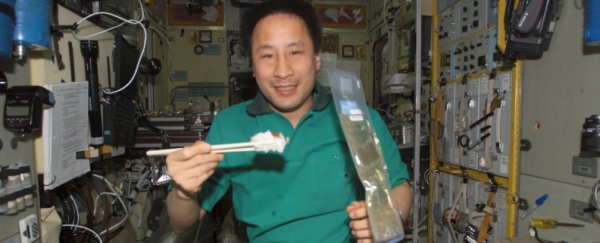The food that will sustain future generations as we colonise our way across space may be none other than our own sh*t, if a new NASA-funded project is successful.
The US space agency has allocated researchers at Clemson University in South Carolina US$200,000 a year for up to three years to figure out how to recycle human faeces into synthetic food that could sustain astronauts during extended journeys or on a Martian colony.
The grant was one of eight given to universities around the US, all of which focus on "innovative, early stage technologies that will address high-priority needs of America's space program", NASA reported in a press release.
"These early career researchers will provide fuel for NASA's innovation engine," said Steve Jurczyk, associate administrator for NASA's Space Technology Mission Directorate (we're sure there was no pun intended). "Technology drives exploration, and investments in these technologies and technologists is essential to ensure NASA and the nation have the capabilities necessary to meet the challenges we will face as we journey to Mars."
While there's not a whole lot of information available as yet on this poop project, what we do know is that the title is "Synthetic Biology for Recycling Human Waste into Food, Nutraceuticals, and Materials: Closing the Loop for Long-Term Space Travel" and it's being run by synthetic biologist Mark Blenner at Clemson University.
According to NASA, the project could have big impacts for space exploration by "providing the means to produce food … on site at distant destinations using synthetic, biology-based approaches".
Since the Space Shuttle program ended in 2011, NASA has paid commercial carriers such as Space X to ferry supplies of food to and from the International Space Station (ISS).
But the agency has also been looking for ways for astronauts to grow their own food in orbit, and recent delays and explosions have shown just how important it is for them to be able to sustain themselves - particularly if they're somewhere as hard to get to as Mars.
They're already making some pretty good progress. Back in May, astronauts on board the ISS started growing their own red romaine lettuce, and just last week they performed their first taste test, which looked delicious.
The ISS now even has its own espresso machine (it's important to get the essentials right first). And while many of you out there might be cringing at the thought of eating the byproduct of human faeces, we can guarantee that the ingenuity of science will find a way to make our poop hygienic and delicious. We've already managed to make seaweed taste like bacon, after all.
And when you think about it, astronauts already drink their own pee on the ISS, and have their poop stored for later disposal. So would it really be that bad to turn that waste into a resource that could sustain us in space? We don't think so. But we also don't really want to line up for the first taste test.
You can find out more about the other grants awarded by NASA here.
